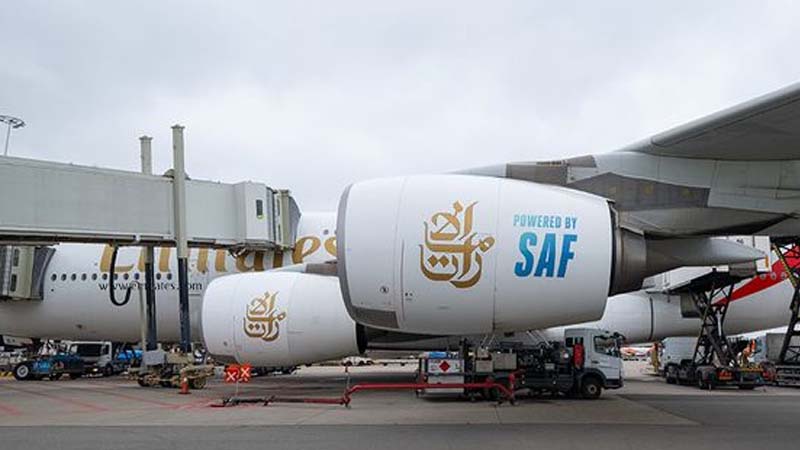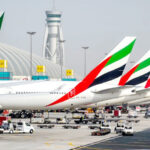
Dubai’s premier airline, Emirates, has taken a significant leap towards sustainable aviation by initiating the use of sustainable aviation fuel (SAF) for its flights departing from Amsterdam’s Schiphol Airport. This pioneering step, announced on Wednesday, marks the activation of the airline’s agreement with Finnish oil refining giant Neste, a deal that promises to transform the aviation fuel landscape.
In a landmark move, over two million gallons of blended SAF will be integrated into the fuelling system at Schiphol Airport throughout 2024. This initiative is not just a routine supply agreement but represents one of the largest volumes of SAF purchased by Emirates to date, a clear indication of the airline’s commitment to environmental sustainability.
The integration of SAF into Amsterdam Schiphol’s fuelling system is particularly noteworthy. “Once fully supplied, the blend will include over 700,000 gallons of neat SAF,” the airline stated. This move is part of a broader strategy by Emirates, which also involves plans to introduce SAF at Singapore Changi Airport in the coming months, further extending its environmental initiatives across its network.
Adel Al Redha, Emirates’ Deputy President and Chief Operations Officer, emphasized the importance of collaboration in achieving sustainability goals. “Working with dedicated partners like Neste is a practical step towards reducing our emissions. This milestone is crucial in our journey as a responsible airline,” Al Redha said. He highlighted the strategic significance of Amsterdam as a major air transport hub and the role such partnerships play in increasing SAF accessibility across the Emirates network.
Emirates’ foray into SAF began in 2017 with its first flight powered by SAF blended with jet fuel from Chicago. The airline has since expanded its SAF operations to include flights from Paris, Lyon, and Oslo. In October of last year, Emirates also integrated SAF into the fuelling systems at Dubai Airport, designating it for several flights, including one to Sydney.
Alexander Kueper, Vice President of Renewable Aviation at Neste, expressed his enthusiasm about the collaboration, noting, “SAF is a ready solution for reducing greenhouse gas emissions from air travel, and it’s exciting to see Emirates using our Neste MY Sustainable Aviation Fuel at Amsterdam Airport Schiphol.”
SAF, as employed in this agreement, can be seamlessly blended into existing jet engines and airport fuelling infrastructure. When used in its neat form, SAF can reduce lifecycle carbon emissions by up to 80 percent compared to conventional jet fuel, making it a game-changer in the industry.
Earlier this year, Emirates further underscored its commitment to sustainability by becoming the first international carrier to join the UK’s Solent Cluster, an initiative focusing on low-carbon investments. This venture could lead to the creation of a SAF plant capable of producing up to 200,000 tonnes per year by 2032, signaling Emirates’ long-term dedication to reducing its carbon footprint.
This significant move by Emirates at Amsterdam’s Schiphol Airport not only reinforces the airline’s position as a leader in sustainable aviation but also sets a new standard for the industry, steering it towards a greener and more sustainable future.




